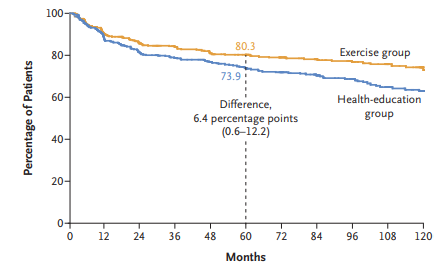Summary: In this well-designed study, a structured exercise program was associated with longer colorectal cancer survival. However, individual results will vary.
Disease free survival
Source: Courneya, et al NEJM June 1, 2025
We all know that exercise is good for us. Exercise is associated with decreased weight, decreased blood pressure, and decreased risk of cardiovascular disease. Exercise also makes many people feel better, and can decrease symptoms of depression. But does exercise improve outcomes of those with cancer?
Researchers at 55 cancer treatment centers randomized almost 900 patients over three years to either a structured and supervised exercise program or educational information about the benefits of exercise. They followed both groups for almost 8 years, on average, and determined that the overall survival rate was 7.1% higher in the structured exercise group. Further, that group continued to exercise far more than the control (education) group even after the intervention ended.
This is a strong study because it was randomized, so it’s not likely that the exercise group had better underlying health than the education group. And yes, the exercise group had 61% more musculoskeletal adverse events (18.5%) than the education group (11.5%).
Implications for employers
Programs to encourage exercise, and to get employees to exercise together socially, likely have health benefits.
Although in this study exercise led to lower rates of death, cancer is very variable. We must be cautious not to assume that someone who dies after a short period with cancer did not “fight hard enough” or do enough exercise. Exercise helps over a population, but for any individual outcomes are more random.




Exercise may enhance immune surveillance, reducing metastatic spread. Interestingly, structured physical activity also correlated with fewer hospital readmissions and improved chemotherapy tolerance, suggesting systemic benefits beyond traditional prognostic factors.